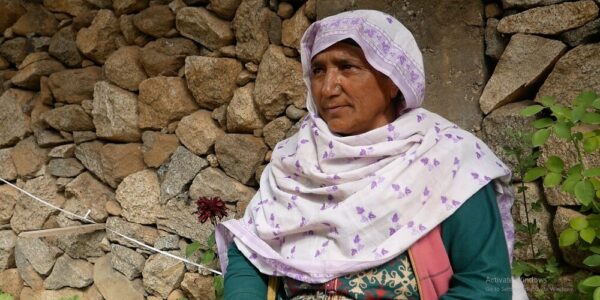From Housewife to Entrepreneur: The Inspiring Journey of “Lakhpati Didi” in Kargil
Fatima Banoo, a resident of the border village of Latoo in Kargil district, has earned herself the title of “Lakhpati Didi”; thanks to her successful venture which is a Self-Help Group. Despite having no formal education, Fatima has not only become a successful entrepreneur but also emerged as an inspiration for women in the Kargil district. Her story represents a shining example of women’s entrepreneurship in Kargil, where the Ladakh Rural Livelihood Mission (LRLM) is making significant changes in the lives of local women, enabling them to become economically independent, morally confident, and adept at communication.
Before the formation of their Self-Help Group, Fatima and her co-workers were housewives with no economic activity. They were primarily involved in household chores like cattle breeding, milking cows, and growing vegetables for personal consumption, which did not provide them with any monetary benefits. They were financially dependent on their husbands for any financial needs.
However, recognizing the need for a change, Fatima and other women in her village decided to establish a Self-Help Group that would not only provide economic opportunities but also empower them to become self-reliant. To kickstart their venture, they collected a monthly contribution of 100 Rupees per member for the group’s functioning, and additionally, the National Rural Livelihood Mission provided them with 15,000 Rupees as initial support. With this capital, they decided to start a poultry farm.
* Click to Follow Voice of Ladakh on WhatsApp *
However, after assessing the risks involved in poultry farming, Fatima and her team made a strategic decision to shift their business to agriculture. They further divided their group into two sub-groups, with one focusing on agricultural activities and the other running shops.
Fatima’s personal journey is particularly noteworthy. Her success is a result of relentless hard work, starting her day early in the morning by milking cows, tending to vegetables, and collecting produce from the farm. At 8: AM, she then travels approximately 24 kilometers to the town, where she sells vegetables, fruits, and vegetable seeds until 6 PM. With her earnings from agricultural practices, Fatima has achieved financial independence, no longer relying solely on her husband and sons for financial assistance. She is now able to spend on her needs and also generously contributes to charitable causes in line with her religious beliefs.
One remarkable aspect of her success is the strong coordination between Fatima and her husband. They firmly believe in the saying, “you cannot clap with one hand alone,” emphasizing the significance of teamwork and mutual support. Fatima’s husband actively assists in all works including transporting produce to the market, and picking Fatima up from the market in the evening. Their joint efforts have been the key to their business’s success.
With the assistance of her husband, Fatima looks after their agricultural farm and a small garden, where they are experimenting with various trees, plants, and cash crops. The garden boasts a diverse array of fruit plants, including apricot, palm, pear, walnut, peach, mulberry, strawberry, and rose plants. What makes this story even more intriguing is that Fatima is cultivating fruit plants that are not native to Kargil; instead, they brought them from Gwalior, and Kashmir, which includes a variety of flowers, fig plants, banana plants, quince and Chinar tree. Despite the challenging climate for these plants in Kargil, they remain hopeful that their efforts will eventually bear fruit.
Indeed, the success of Fatima’s vegetable and cash crop cultivation is far from ordinary, considering the geographical constraints. Their border village, situated near Pakistan-occupied territories, lies approximately 400 feet above the riverbed, resulting in scarce water supply. Despite these hardships, Fatima and her husband continue to persevere on their farm, manually carrying water in cans from a large water tank filled by her husband from the river carrying in a load carrier vehicle.
To tackle the issue of water scarcity, the administration had installed solar lift irrigation in their village, Latoo. Unfortunately, due to unforeseen reasons, this water supply is currently inaccessible to them. As a result, during drought-like situations or periods of water scarcity, they shift their focus from agricultural practices to cultivating fruit plants, which require less water to thrive. Despite the challenges, Fatima’s determination and resourcefulness remain unwavering.
Fatima, the “Lakhpati Didi,” is not the only successful woman in the Kargil; there are several other inspiring examples. Some have achieved lakhpati status by selling apricots, while others have accomplished it by running cement shops. In total, there are 68 active Self-Help Groups (SHGs) operating in different fields within the Kargil block, according to Cluster Mobiliser Mehmooda Banoo.
During an interview with the Voice of Ladakh correspondent, Assistant Commissioner for Development (ACD) Kargil, Ghulam Mohammad, revealed that there are 443 registered SHGs spread across five blocks in Kargil. These SHGs engage in various trades, with some focusing on reviving local and traditional products, such as apricot processing, apple production, woolen products, sea-buckthorn, local bakery items, weaving, knitting, and tailoring. Additionally, some groups concentrate on cash crops borrowed from other regions, including flowers like lilium, gladiolus, mulberry, and pickle making. On the other hand, certain SHGs have gained recognition by selling cement, producing sanitary pads, bakery items, foods, and beverages.
The establishment and effective functioning of Self-Help Groups receive crucial support from the Ladakh Rural Livelihood Mission (LRLM) in the form of financial and technical assistance. The mission offers a revolving fund of Rupees 40,000 and a Community Investment Fund of Rupees 1,40,000 to the SHGs. Additionally, the SHG members themselves contribute Rupees 100 every month to fulfill their business requirements, as highlighted by ACD Ghulam Mohammad.
Successful functioning of Self Help Groups relies on the coordination and cooperation among their members over an extended period. Recognizing the significance of this aspect, the Ladakh Rural Livelihood Mission has taken the initiative to form village mobilizers voluntarily. These mobilizers offer valuable counseling and guidance on how to effectively coordinate and organize the groups. Moreover, the LRLM also conducts training sessions to equip the SHG members with essential skills and knowledge to enhance their collective efforts.
The products crafted by the SHGs have significantly transformed the lives of the women involved, bringing positive changes at the grassroots level. However, the ACD emphasizes that improving packaging, labeling, branding, and marketing strategies would enable these products to access a broader market beyond the local one. At the grassroots, the SHGs work with various raw materials and produce, including apricots, processed apricot items, sea-buckthorn products, woolen goods, mushrooms, organic vegetables, apples, bakery items, and more. These items hold considerable demand in both the national and international markets. Unfortunately, the lack of proper packaging and marketing poses a challenge in reaching these products to their full potential markets.
Furthermore, the SHGs are confronted with a shortage of machinery for efficiently processing raw materials, such as apricots for making jam or extracting oil from apricot seeds. The lack of access to essential machinery is compounded by the small regional population, resulting in a scarcity of resource persons with the technical expertise needed to guide them in procuring suitable and precise machinery. This limitation hampers their ability to fully optimize production processes and hinders their potential for growth and expansion.
To address these challenges, the LRLM has taken a proactive approach by initiating the purchase of a juice-producing machine and a packaging and labeling machine. These acquisitions aim to ensure that the SHGs can engage in proper packaging and labeling of their products, enhancing their presentation and marketability. Additionally, recognizing the importance of quality and safety standards, the LRLM has assisted the mostly illiterate SHG women in obtaining the FSSAI tag for their products. This valuable support empowers the women to meet the necessary regulatory requirements and further expand their reach into broader markets, boosting their overall success and impact.
Women Self Help Groups (SHGs) are playing a crucial role in women empowerment, with a substantial number of women actively participating in these initiatives. SHGs have proven to be instrumental in empowering women by providing them with sustainable livelihood opportunities and fostering economic independence. As a result, women have gained confidence in making decisions, expressing themselves publicly, and advocating for their rights.
3 Comments
Leave a Reply



A Inspiring story,
more power to your pen.